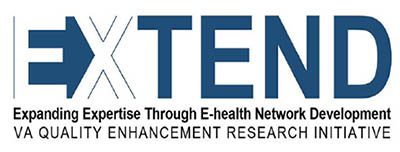
|
|
Research HighlightNew EXTEND QUERI Center Pursues Evidence-Based Telehealth Services for VeteransKey Points

In partnership with local, regional, and national VA leadership, the new EXpanding expertise Through E-health Network Development (EXTEND) Center plans to expand the reach and effectiveness of VA care to improve Veteran outcomes by delivering high-quality, evidence-based telehealth services. The Indianapolis, Indiana-based Quality Enhancement Research Initiative (QUERI) Center has been continuously funded since 2004 and has evolved from an initial, cerebrovascular-focused QUERI Center to its currently funded EXTEND QUERI Center. Over the next five years (FY 21-25), the EXTEND QUERI Center plans to:
EXTEND Will Implement Multiple Evidence-Based PracticesEXTEND is implementing multiple evidence- based practices that have robust effectiveness evidence and that have the potential for positive impact on high priority Veteran conditions: TeleGrace (coordinated geriatric care); TeleNeurology (Neurology specialty care for outpatient stroke and transient ischemic attack (TIA) management); and TelePrimaryPain (collaborative care for pain in primary care). We strategically designed these projects to target multiple evidence-based practices implemented across various levels of the emerging telemedicine context – local, VISN, and national levels – to achieve VA’s goal of “Anywhere to Anywhere,” a 2017 VA-enacted telehealth practice that uses VA Video Connect technology to cross traditional organizational and geographic boundaries, and to connect with Veterans on electronic devices. TeleGrace is led by Co-Principal Investigator (Co-PI) Dr. Dawn Bravata in collaboration with Veterans Health Indiana Chief of Geriatrics, Dr. Cathy Schubert. The program will be implemented in the Veterans Health Indiana healthcare system. The TeleGrace project supports the overall EXTEND program goal by expanding access to the evidence-based VA Geriatric Resources for Assessment and Care of Elders (GRACE) program. The VA GRACE program involves geriatric-focused home visits, followed by multidisciplinary meetings to discuss each Veteran’s plan of care, along with ongoing collaboration with VA primary care. The VA GRACE program directed by Dr. Schubert has been shown to improve outcomes among high-risk older persons. However, VA GRACE is limited by a 20-mile drive distance for the home visits that are an essential component of the program. The TeleGrace project seeks to improve the reach of VA GRACE by implementing virtual home visits to overcome the drive-time distance barrier that currently prevents its widespread application to eligible older Veterans. The TelePrimaryPain project, led by Co-PI Dr. Alan McGuire, a VA clinical research psychologist, is based upon the robust effectiveness pain trials of collaborators and Indianapolis-based HSR&D scientists Dr. Kurt Kroenke and Dr. Matthew Bair. TelePrimaryPain will focus on providing primary care collaborative pain management via telehealth featuring telehealth nursing care. We will partner with Veterans Affairs Medical Centers across the United States to test two bundles of strategies for implementing this evidence-based, telehealth program. Sites will receive toolkits and guided training plus an enhanced implementation bundle with additional elements such as external facilitation, local site adaptation and tailoring, remote monitoring, and systems redesign. We will compare sites on their ability to reach Veterans and clinics, change in Veterans’ pain functioning, and other key implementation outcomes. TeleNeurology will provide telehealth-based, outpatient, post-stroke/TIA managementm for Veterans at VA medical centers and community-based outpatient clinics with limited access to neurology care. TeleNeurology is a national initiative by the VA Office of Specialty Care (Neurology) Services. EXTEND QUERI Co-PI Dr. Linda Williams, a VA stroke neurologist and HSR&D clinical scientist, is leading the evaluation of TeleNeurology and plans to compare and evaluate two models of telehealth delivery: e-consultation (neurologist to primary care physician) versus a video Teleneurology consultation (neurologist to Veteran patient). Veterans receiving care at participating VA Medical Centers enrolled in the TeleNeurology program (currently planned for 10 facilities) across the VHA will be randomly assigned to the e-consult versus usual Teleneurology. We will compare the quality of the consultation using a composite of key evidence-based stroke care processes relevant for secondary stroke prevention and will also evaluate Veteran and VA provider satisfaction with the consultation. The EXTEND QUERI’s implementation core is led by Co-PI Dr. Teresa Damush, an HSR&D Research Career Scientist, and includes a multidisciplinary team of implementation scientists including HSR&D research scientists Drs. Edward Miech, Lauren Penney, and Nicholas Rattray and an HSR&D data scientist, Dr. Laura Myers. The core spans across each project to operationalize bundles of strategies to implement the respective evidence-based practices, measure and evaluate the context in which implementation occurs, prepare local adaptations, plan and evaluate sustainment, and disseminate implementation playbooks. The EXTEND QUERI Center is featuring a newly developed tool, the Site Implementation Progress Report (the SIPREP), an app-based tool developed by Dr. Miech to assist with implementation and sustainment. The EXTEND QUERI Center is an expanded level three QUERI Center that now includes additional cores and responsibilities. Dr.Dawn Bravata and Dr. John Ney, health economist from the Bedford VAMC HSR&D Center of Innovation will guide the budget impact analyses across the three targeted programs. The EXTEND QUERI is now charged with mentoring VA scientists on implementation science and methodology. Drs. Bravata, Damush, and Penney are leading the mentoring program with a combination of didactic learning and applications through a community of practice. In FY21, we have begun mentoring 11 VA clinicians and scientists. Finally, the EXTEND QUERI is also tasked with executing Rapid Response Teams (RRT) to engage operational partners with rapid quality improvement evaluations. Dr.Alan McGuire is leading our first RRT focused on ehealth use in VAMC inpatient mental health services in partnership with Dr. Gayle Iwamasa, PhD, HSPP, National Director, Inpatient Mental Health Services. For more information about the EXTEND QUERI Center, please contact our administrator, Ms. Jennifer Myers, Jennifer.Myers@va.gov. |
|